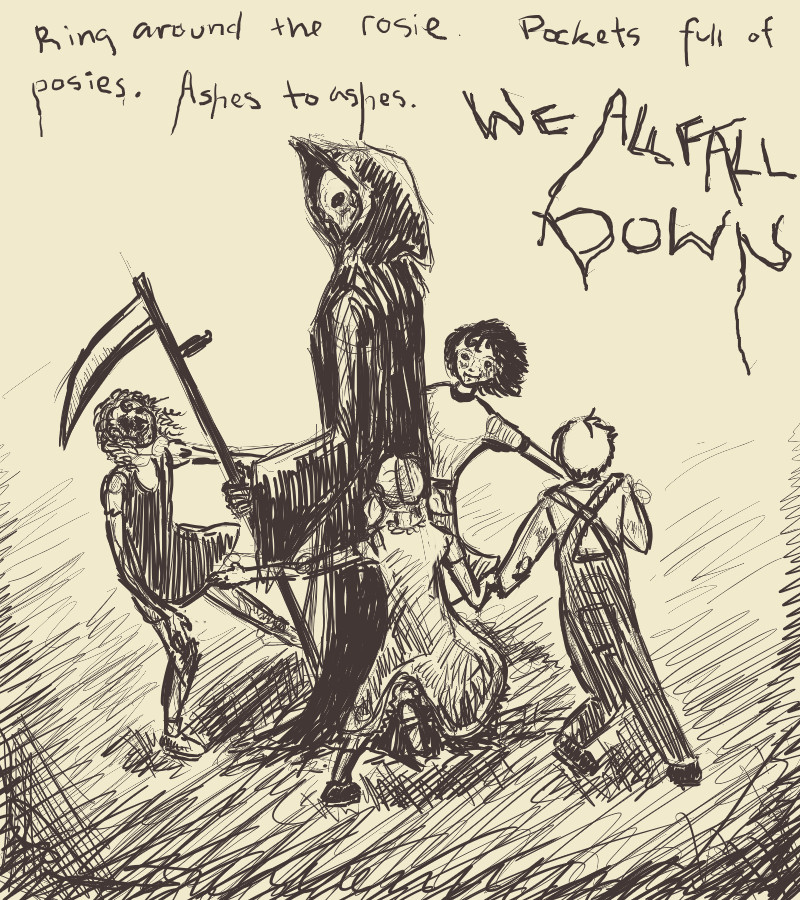Shakespeare was no stranger to the pandemic, he lived his entire life in the shadow of the pandemic.

“Ring a ring o'roses A pocket full of posies Atishoo! Atishoo! We all fall down”
One of the most famous children’s rhymes referred to as Bubonic plague happened in 14th century Europe. It is also referred to as the Black Death. It is one of the worst-hit pandemic ever recorded and it swept away one-third population of Europe. People who fell victim to the plague got red rings on their skin. Ring a ring of roses referred to the red rings on the skin, the first symptom of the plague that is, buboes. A pocket full of posies is a pocket full of flowers (collection of pomanders). People used to keep the collection of the flowers in the locket thinking that sniffing these sweet-smelling flowers is the best defense against the plague. Atishoo Atishoo, is the sneez. Even though you’re sniffing the flower you still get sick and we all fall down refers to the widespread Death.
Shakespeare was no stranger to the pandemic, he lived his entire life in the shadow of the pandemic. Pandemic shaped his thinking, his language and, his career. Shakespeare was a migrant to London from the village of Stratford-upon-Avon in the year 1592. In August that year, London witnessed its horrific outbreak of bubonic plague. During the outbreak of 1592-93, the Crown ordered the complete closure of all theatres in London. Shakespeare, then working with Lord Strange’s Men at the Rose theatre, financially shocked by the order.
He presumably moved to London to become an actor, not a playwright. After two years of the pandemic, he did not write for the stage therefore he tried his hands on poetry. During the lockdown, he wrote two long poems Venus and Adonais, and The Rape of Lucrece. Both were clearly written by someone who had a pandemic in his mind.


Plague constantly appears throughout Shakespeare’s works in the form of everyday exclamations: “a plague upon it when thieves cannot be true to one another”; “a plague of sighing and grief! It blows a man up like a bladder”; “a plague upon this howling”; “a plague of these pickle-herring!”
Shakespeare mentions plague in several plays. Also, he portrayed rose as a symbol of death and sweetness or sweet smells as a deadly cover for death. In Romeo and Juliet he wrote:
Within the infant rind of the small flower Poison hath residence and medicine power For this, being smelt, with that part cheers each part Being tasted stays all senses with the heart
He describes the act of searching out plague victims and quarantining them in Romeo and Juliet (5.2.7). Incidentally, plague is the indirect cause of the deaths of the star-cross’d lovers. in the years between 1606 and 1610—the period in which Shakespeare wrote and produced some of his greatest plays, from Macbeth and Antony and Cleopatra to The Winter’s Tale and The Tempest.



However, deaths from the plague led to the closure of theatres. The disease reached the playwright’s house in London and was to change his professional life, and the whole of drama, forever.
Written By: Mohit Vyas
Editor and Team Lead: Ashutosh Sharma
About The Author(s)
Chemistry major with self-proclaimed good taste in Books and Music.

